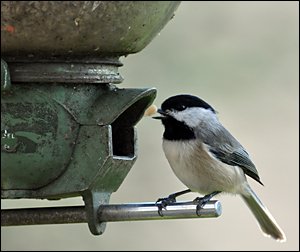 Connecting with nature is great. It can bring calm to a person. It can also provide an opportunity to stop the daily chaos and enjoy life. However, sometimes not so pleasant things can interrupt your enjoyment, especially when you find maggots in your bird feeder. This post is here to help, offering up solutions to five common birding problems so you can get back to enjoying nature.
Connecting with nature is great. It can bring calm to a person. It can also provide an opportunity to stop the daily chaos and enjoy life. However, sometimes not so pleasant things can interrupt your enjoyment, especially when you find maggots in your bird feeder. This post is here to help, offering up solutions to five common birding problems so you can get back to enjoying nature.
1 – My bird feeder has maggots
Chances are your birdseed was infested before you ever put it into the feeder. Start by trashing your remaining birdseed, if you have any. Then make sure you’re storing it correctly. Store your birdseed in an airtight container, so it isn’t exposed to rodents, flies or other harmful creatures. Ensuring your birdseed is kept dry is also very important. Damp birdseed can grow mold, which can cause respiratory issues in birds.
So now that you’ve addressed your storage issues, you need to correctly clean your bird feeder. Take it apart, spray the pieces with a garden hose and then plop them into a solution of 10% bleach to 90% warm water. Let the pieces soak for at least an hour, then spray them off completely. Air dry your bird feeder before refilling and hanging.
Speaking of cleaning, bird feeders should be cleaned weekly and disinfected monthly.
2 – My bird feeder is popular … with mice!
Rodents enjoy birdseed, there’s no way to change that. If you’ve got a rodent infestation in or around your bird feeder, the only answer is to stop feeding altogether for a few weeks.
After the rodents are gone, find a way to capture any falling seed. Some birdfeeders are designed to catch fallen seed. You can also try adding a large catch tray under your feeders. Remember trays should be cleaned and disinfected regularly to ensure Salmonella bacteria does not end up spreading to the birds.
Another common reason why rodents are attracted to bird feeders is squirrels. Squirrels ransack birdfeeders, spilling seed on the ground. There are squirrel proof bird feeders available to combat this problem.
3 – An egg dropped from our birdhouse … can I touch it?
The old adage is: if you touch an egg, you’ll leave your scent and the mother bird will want nothing to do with it.
However, it’s not true. You can pick it up and put it back in the nest, as long as it’s not cracked. Keep in mind that sometimes the mother pushes an egg out of the nest if it’s not fertile, or if another egg has hatched and she needs the room. So refrain from putting the same egg back again and again.
4 – There’s a baby bird on the ground and I don’t want it to die!
It can pull at your heartstrings when you see a helpless, defenseless baby bird on the ground, with no mother bird in sight. Your first reaction may be to pick it up, take it home, put it in a shoebox and feed it from a dropper. You must resist this reaction. It is actually illegal to hold a wild bird in captivity, even if you’re trying to help it. The laws are in place to protect not only humans, but the birds as well.
Birds can spread diseases too. So, hard as it may be, it is best to leave the baby bird alone – do not touch it.
5 – Birds are flying into our windows and dying
A childhood memory I won’t forget. Sitting at the dinner table on a summer evening when the casual conversation is interrupted by a large thump.
Birds fly into windows, not because they are trying to get in, – cue Alfred Hitchcock’s The Birds clip – but because they are trying to attack themselves. More specifically, they are trying to attack the bird they see in the window that they don’t recognize as themselves. Typically occurring during breeding season, when birds are at the height of their territorial madness, the practice usually subsides once the season is over. In the meantime, hang up a curtain, install some mini-blinds or put decals on the windows. Something to break the reflection and ultimately stop birds from getting injured.
About the author: Michelle Anderson, a guest blogger, regularly writes about birds, including how to get the most of a bird feeder and how to care for hummingbird feeders.
Credits: Photo courtesy of Mike Munchel.